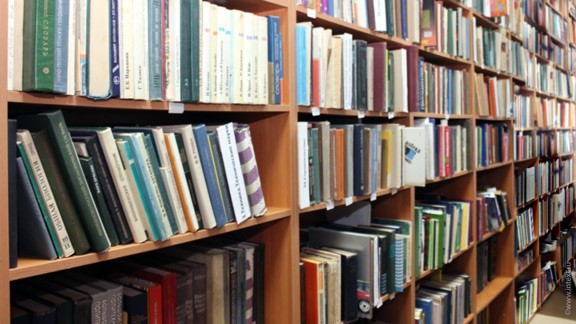14.10.2014
A recent systematization of the library of Yuriy A. Kalenyuk, co-founder of InText, revealed that the collection is perhaps among the largest private foreign language libraries in Ukraine. It contains over 4,000 items, 1,000 of which are specialized dictionaries and reference books covering a variety of subject fields: patents and trademarks, maritime and naval science, business and finance, telecommunications, computational engineering, aerospace, solar energy and electrical and power engineering, etc. It is a remarkable source of field-specific terms and texts that can help translators and reviewers in their daily work.
Terminology is one of the most expertise-sensitive matters when it comes to technical translation. Keeping consistency is effectively resolved these days with the help of CAT tools and terminology management applications. However, keeping accuracy and adequacy in translation solely depends on the knowledge and experience of translators and reviewers. Professional translators continuously strive to improve the quality of their work through a deeper understanding of products, processes and the technologies they translate about. Professionals use monolingual and single-field dictionaries to make sure that their comprehension of the source text is full or, in the case of producing the target text, the equivalent they found was the best possible. When it comes to translation into Russian and Ukrainian, it is particularly important to verify sub-field terminology using printed glossaries and reference books.
Olexandr Oliynyk, Chief Editor for Technical and Engineering Translation Group:
"Translators have to find a response to a real challenge: what terminology base is to be used in a certain text. They should find the right set of terms for describing in their native language the innovative device, process or newly invented physical phenomenon, which take place when a new component is produced, operated or serviced.
The situation becomes even more complicated when we are the witnesses of the emergence of new technology. Hundreds of scientists and engineers are working on this very problem and it's most probable that one of them has ordered this translation trying to facilitate their own scientific or technology effort. They are expecting from you a good text with the proper terms and right recommendations.
So, a translator has to do their best. They have to involve their gut instinct, knowledge and competency; in another words - to convert their diligence into successful translation starting to look for terms, to read papers and thesis works."
Yet, most of the dictionaries and reference books, even today, reside in printed format. Translators often have little time to spare in order to refer to printed information. Yet it is the paper-based glossaries and dictionaries that hold this unique knowledge, particularly when it comes to field-specific vocabulary, like power engineering, aerospace or helicopter construction.
The application of information storage technologies will allow in-house translators and reviewers to save time with faster and more convenient access to the extensive pool of paper-based knowledge.


